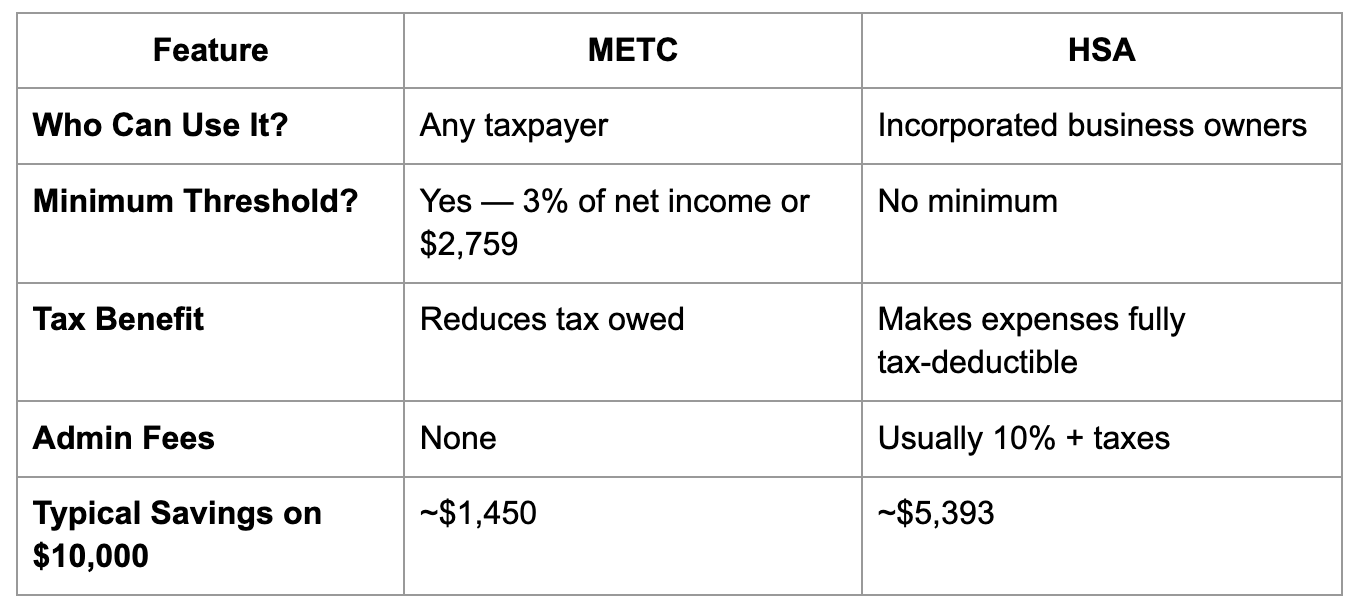HSA vs. METC: How to Save Thousands on Medical Expenses

How Ontario Small Business Owners Can Save Thousands on Medical Expenses
Paying for medical expenses out-of-pocket can feel like a never-ending drain on your wallet. The good news? Canada’s tax system offers two ways to soften the blow: the Medical Expense Tax Credit (METC) and Health Spending Accounts (HSA).
Both can save you money — but one of them is a game-changer if you’re an incorporated business owner in Ontario. Let’s break it down.
What Is the Medical Expense Tax Credit (METC)?
The METC is a non-refundable tax credit you can claim on your personal tax return.
- Non-refundable means it can lower the tax you owe, but it won’t give you a refund beyond that.
- You can claim eligible expenses such as prescription drugs, dental care, certain medical devices, and professional health services.
- You can claim any 12-month period ending in the current tax year — but only once.
- The catch? You can only claim expenses that exceed the lesser of 3% of your net income or $2,759 (for 2024).
How the METC Works in Ontario
Here’s a real example for an Ontario resident:
Net Income: $100,000
Eligible Medical Expenses: $10,000
Ontario’s Lowest Marginal Tax Rate: 5.05% (federal lowest rate is 15%)
Step-by-step:
- 3% of $100,000 = $3,000
- Compare $3,000 with $2,759 → lower is $2,759
- $10,000 − $2,759 = $7,241
- Multiply $7,241 by the combined lowest federal + provincial tax rate (15% + 5.05% = 20.05%) → $1,450.42
Result: Your non-refundable credit is $1,450.42.
That’s something — but what if you could make the entire $10,000 tax-free?
What Is a Health Spending Account (HSA)?
A Health Spending Account is CRA-approved and allows incorporated business owners to turn 100% of their personal medical expenses into before-tax business expenses.
In other words: your company reimburses you for medical costs, the reimbursement is tax-free for you, and your company deducts it as an expense.
It’s like paying for braces, dental work, or physiotherapy with pre-tax dollars.
HSA Savings Example – Ontario
Let’s use the same $10,000 in medical expenses.
Marginal Tax Rate: 43% (typical for someone earning $100,000 in Ontario)
Admin Fee: 10% = $1,000
Applicable Taxes:
- HST (13%) on admin fee = $130
- RST (8%) on claims = $800
- PST (2%) on claims + admin fee = $220 (2% of $11,000)
Without an HSA:
- You’d need to earn $17,543 in gross income to have $10,000 left after tax to pay the bill.
- $7,543 of that is tax.
With an HSA:
- Your company pays:
- $10,000 medical claim
- $1,000 admin fee
- $130 HST (on admin fee)
- $800 RST (on claims)
- $220 PST (on claims + admin fee)
- Total cost to the company: $12,150
- You pay $0 in personal tax on the reimbursement.
The Savings
$17,543 − $12,150 = $5,393 saved — a 30.7% reduction in cost.
METC vs. HSA – Which Wins?

Bottom line: METC helps, but HSA supercharges your tax savings if you’re incorporated.
Why Many Ontario Small Business Owners Choose an HSA
- Immediate Savings: Turn personal expenses into business deductions instantly.
- No Minimums: Claim every eligible dollar.
- Broad Coverage: Includes dental, vision, physio, massage, prescriptions, and more.
💡 Important: You can’t claim the same expense for both the METC and an HSA — you have to choose one.
Final Word
If you’re an incorporated business owner in Ontario, a Health Spending Account (HSA) can save you thousands more than the METC. It’s one of the most effective (and CRA-approved) strategies to reduce your tax bill while covering essential healthcare costs.
Build your plan for free
Get started today by building your plan. No upfront payments. No long-term commitments. Entirely pay-as-you-go. You won't incur any costs until your team submits a claim.




